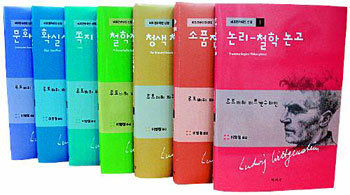Wittgenstein

Ludwig Wittgenstein (1889-1951) was a famous philosopher whose name has been used as a band name led by a rock star who majored in philosophy. However, few people have read his work.
This is because of an overblown fear in the philosophical arena that his work is difficult. His philosophy is known to be difficult to understand, largely because Wittgenstein said even Bertrand Russell, who praised Wittgenstein, misunderstood him.
Bookworld Publishing attempts to accurately understand Wittgenstein. The publisher released the entire 21-volume work of Nietzsche last year. This time, it has published the first of the translation of what is to be a total of seven volumes. Tractatus Logico-Philosphicus and Philosophische Untersuchungen, the two works that represent the first and second halves of Wittgensteins philosophy, are the ones published.
Professor Lee Young-chul of Pusan National University translated the books in the mid 1990s. He studied the completed work that has been published in Europe since then and revised his translation to be newly published. This will be followed by some posthumous works and The Blue and Brown Books, a collection of the philosophers lectures by his students. The entire work will be translated by Lee.
It is true that Wittgensteins philosophy is profound, but it is not too difficult for laypersons. His first work, Tractatus Logico-Philosphicus, which led the engineer turned philosopher to believe that he solved millennia-old philosophical problems before he turned 30, is not even 100 pages long.
The key message of this book is, Language only has meaning when it portrays the facts of the world. Philosophical questions or arguments cannot be answered because they are non-meaning propositions that are irrelevant to the description of facts. This message appears in most introductory books to philosophy. However, the inspirational sentences you see in Lao-tzus Tao-te Ching or books by Chuang Tsu can only be seen in Tractatus Logico-Philosphicus.
This book is a series of short sentences. Chapter Seven consists of only one sentence. You must be silent about things that cannot be said. The aura of this short sentence can only be experienced by those who read the book.
Chae-Hyun Kwon confetti@donga.com




![‘건강 지킴이’ 당근, 효능 높이는 섭취법[정세연의 음식처방]](https://dimg.donga.com/c/138/175/90/1/wps/NEWS/IMAGE/2026/01/18/133181291.1.jpg)

![[단독]“여사님 약속한 비례 유효한지”…윤영호, 해임 뒤에도 건진에 청탁](https://dimg.donga.com/c/138/175/90/1/wps/NEWS/IMAGE/2026/01/19/133186326.1.jpg)
